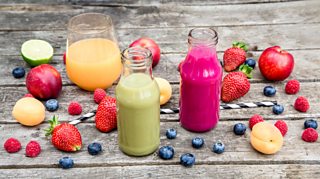What is making my child fat? How we can solve the UKβs child obesity issue
In an average class of 30 ten and eleven-year-olds, six are obese and four more are overweight. That’s twice as many as 30 years ago. And obesity brings in its wake a host of crippling diseases. The youth of today are set to be the first generation to be outlived by their parents.
When Professor Dame Sally Davies left her role as Chief Medical Officer for England in 2019, she didn't go quietly. Instead, she published a strongly titled, independent, 96-page report with a rallying call: Time to Solve Childhood Obesity. “The Government ambition,” she wrote, “is to halve childhood obesity by 2030 – in England, we are nowhere near achieving this. Yet, if we are bold, we can.”
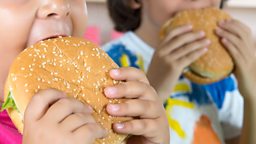
-
![]()
The Food Programme: What Is Making My Child Fat?
Finding Solutions to the UKβs Child Obesity Issue.
So how do we go about solving the child obesity crisis? In The Food Programme, Sheila Dillon is joined by a panel of experts to discuss the issues and find possible solutions in the fight back against fat.
Whole foods over processed foods
We used to eat whole foods, whether that was fruit, vegetables, grains or meat. “Now we’re eating ultra-processed foods,” says Jenny Rosborough, a nutritionist and healthy food campaigner, “and they are made up of sugar and salt and other cheap ingredients.”
We need to look at what is contributing to the nutrient profile of each food that we and our children eat, and opt for whole and high fibre foods.
Dr Andrew Jenkinson, consultant in bariatric and general surgery at UCLH and author of Why We Eat Too Much, says this is more important than calorie counting – the traditional way of understanding why a population becomes obese.
Actually, what really effects a person’s weight is the impact of these highly processed foods.

Salt danger: where it's hidden in food and drink
High blood pressure is simply a consequence of too much salt.
Takeaway chains outside schools? Be gone
Where are there more ultra-processed foods than anywhere else? Takeaway and fast food joints.
One study has shown that those with takeaway outlets near their home and work are almost twice as likely to be obese. And children on their way to and from school are surrounded by temptation.
In fact, takeaway owners actively choose their locations so they can capitalise on this captive teenage market. “There’s good evidence from the States that takeaway food outlets cluster disproportionately around schools,” says Dr Thomas Burgoine, a public health geographer from the Centre of Diet and Activity Research at the University of Cambridge.
Thankfully, some UK councils are now putting in place planning policies to introduce exclusion zones around schools. This means that when a prospective takeaway owner applies for planning permission, computer says no.
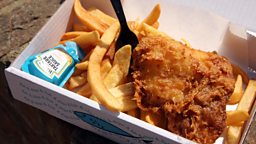
Children need cheap, healthy options on their doorstep
Takeaways appeal to children because they’re cheaper than the fare on offer at the school canteen. We know that the growth of the takeaway market is greater in more deprived areas for this very reason. These food outlets then target the teenage pound directly through cut price student meal deals.
Those with takeaway outlets near their home and work are almost twice as likely to be obese.
On top of that, places for kids to congregate are limited. Many after school clubs ask for fees, so if you’re from a low socio-economic background then you need an alternative venue in which to hang out with your mates. The local fried chicken shop is an appealing option.
What if there were cheap healthy-eating venues surrounding our schools instead?
Should there be a tax on processed foods?
In 2018 the government introduced the Soft Drinks Industry Levy – also known as the ‘Sugar Tax’. Is it working?
Tim Rycroft, Chief Operation Officer of the Food and Drink Federation, says it’s accelerated reformulation in soft drinks, and helping to take sugar out of the market. In a statement, the Department of Health said, “Robust government action has decreased the sugar content in soft drinks by 28.8%.”
So, should we be taxing processed foods too, to reduce the price discrepancy between healthy and fast food?
Dr Andrew Jenkinson says yes: “I think we need to be really bold with the amount of tax that we put on to not just sugar but actually all processed foods.” The revenue generated could be used to better educate people around healthy eating.
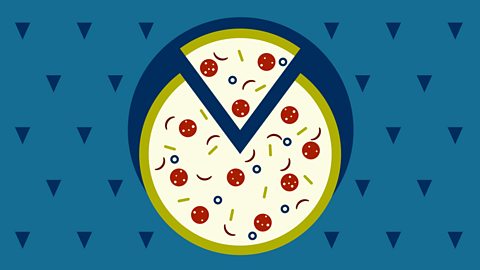
Why youβre eating far more sugar than you realise
Dr Michael Moseley on whether the food industry is doing enough to reduce sugar in food.
Advertising needs to be better regulated
Children are bombarded by fast food and drink adverts on their way to school, at the bus stop, on the TV and on their social media feeds. “We need to call time on the fact that we are surrounded by a flood of unhealthy food and drink and advertising,” says Professor Dame Sally Davies.
The blanket ban on tobacco TV advertising has seen the sale of cigarettes plummet. Could the same work for processed food?
-
![]()
The Food Programme: What Is Making My Child Fat?
Finding solutions to the UKβs child obesity issue.

We need greater change within schools
Dame Sally suggested that schools and nurseries should have a central role in reducing childhood obesity. Schools have been the focus of government backed healthy eating campaigns for a long time and many are making good progress, offering healthy food options and banning fizzy drinks. But can the input start earlier?
Children need the opportunity to try ingredients if they are to expand the range of foods theyβll eat.
“We need to put a lot more focus on the early years and developing those healthy behaviours and relationships with food,” says Jenny Rosborough.
We eat what we know, so we need kids to develop greater familiarity around food, and to accept new foods and new tastes from a young age.
Food is a sensory adventure. Children need the opportunity to try ingredients, if they are to expand the range of foods they’ll eat. That’s why Washingborough Academy in Lincolnshire – which has its own orchard and kitchen garden – has introduced Taste Ed classes where children as young as four and five learn about food through touch, taste and smell.
Better transparency on food labelling
Where consumers are offered a range of products, including healthy options, can the food industry be blamed for unhealthy choices?
Now we have food labelling with βlow sugarβ, which often translates as high fat, and βlow fatβ, which often means high sugar.
Dr Andrew Jenkinson says yes, because the scientific advice on what to eat and what not to eat have been “hijacked” by the food industry.
Now we have food labelling with “low sugar”, which often translates as high fat, and “low fat”, which often means high sugar. Labelling can be confusing, and focusing on one nutrient or ingredient is unhelpful.
We need better, clearer, more transparent labelling on our processed foods.
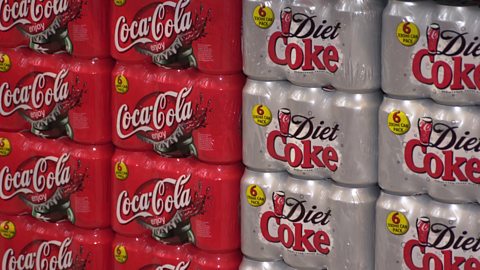
Why sugar-free fizzy drinks donβt help you lose weight
Dr Anthony Laverty talks about a new research paper and what the findings were.
Could doctors be better trained in how to advise on weight issues?
Juliet Burridge is a student at the University of Birmingham and a member of , a medical, student run organisation aiming to promote nutritional education in medicine.
She wants to see healthcare professionals trained so they can have more effective conversations about weight and wellbeing within the healthcare system – with parents and children alike. By getting psychologists involved and having multidisciplinary teams practice these conversations we can better embed them into healthcare.
To quote Dame Sally Davies: “There is no magic bullet.” Preventing childhood obesity is complicated. But implementing some of the measures above could just help to turn the tide.
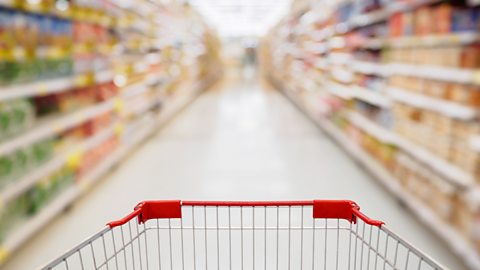
Are supermarkets designed to make you fat?
Nine out of ten products displayed in supermarkets at a childβs eye level are unhealthy.
More from Radio 4
-
![]()
The Food Programme: What Is Making My Child Fat? Part 1
Sheila Dillon speaks to children and young people seeking solutions to obesity in the UK.
-
![]()
The Food Programme: What Is Making My Child Fat? Part 2
Sheila Dillon puts your questions on child obesity related health to an expert panel.
-
![]()
Can you combine wellbeing and weight-loss?
How easy is it to revamp your lifestyle and health whilst still caring for your wellbeing?
-
![]()
From E133 to MSG: Your guide to food additives
A quick guide to the bewildering world of food additives.



